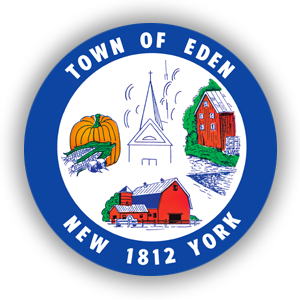Eden Town Hall
Attn: Disaster Preparedness Committee
2795 East Church Street
Eden, New York 14057
(716) 992-3408
(716) 992-4131 (Fax)
Town Supervisor:
Melissa M. Hartman
Hours of Operation:
Mondays, Tuesdays,
Thursdays, & Fridays
8:00am – 4:00pm
Wednesdays
8:00am – Noon
Disaster Preparedness Committee
Mission Statement: To offer professional mitigation, preparedness, response and recovery services that reduces the impact of disaster, injuries, economic losses, loss of lives and enhances the speedy recovery from these disasters.
Download and Review the Town of Eden Disaster Preparedness Guidelines for Residents
Emergency Response Form
The Eden Emergency Squad, Eden Volunteer Fire Department, East Eden Volunteer Fire Department, and the Eden Town Hall are compiling a data base of the town residents who are on any type of in-home life support, for example, in-home oxygen or dialysis, etc. This information will be on hand for these organizations in the event of a disaster in our community. All information is strictly voluntary and will be kept confidential.
We ask that any member of a household fill out the “Town of Eden Emergency Response Form” and return it to: Supervisor’s Office, 2795 E. Church St., Eden, NY 14057. If you have questions, call the Eden Police Department at 992-9211.
- Robert Stickney
- Maurice Dole
- Nicholas Blasz
- Joseph Flynn
- Malcom VanKoughnett
- Scott Hultquist
- Rick Kirst
- Bill Laing
- Ron Maggs
Rich Ventry (Liaison)
Become Informed
- Learn your community’s disaster preparedness or Emergency plan
- Learn what disasters are most likely to occur in your area. Request information on how to prepare for each.
- Learn about animal care after a disaster. Animals are not allowed inside emergency shelters because of health regulations.
- Find out how to help the elderly, or disabled persons, if needed.
- Be a Good Neighbor, and help one another. Make plans for childcare in case parents can’t get home.
- Learn Red Cross First Aid and CPR.
- Get training from the fire department for each family member on how to use the fire extinguisher (ABC type), and show them where it’s kept.(test & recharge)
- Show each family member how and when to turn off the water, gas, and electricity at the main switches
- Create a Disaster Plan for your family
- Meet with all members of your family and discuss a plan where to meet should a disaster occur. Discuss what steps will be taken for evacuation. Plan how to take care of your pets.
Maintain a Checklist
- Post emergency telephone numbers by phone (fire, police, ambulance, etc.)
- Teach children how to dial 9-1-1.
- Check if you have adequate insurance coverage.
- Install smoke detectors and Carbon Monoxide detectors.(test monthly & change batteries once a year)
- Charge cell phones
- Stock emergency supplies and assemble a Disaster Supplies Kit
Emergency Supplies
- Keep enough supplies in your home to meet your needs for at least 3 days, (5-7 ideal). Assemble a Disaster Supplies Kit with items you may need in an evacuation. Store these supplies in sturdy, easy-to-carry containers such as backpacks, duffel bags, or covered trash containers. Include in your Disaster Supply Kit
- A three-day supply of water, food that won’t spoil
- Manual Can-opener, Utensils
- One change of clothing and footwear per person, one blanket or sleeping bag per person
- A first Aid kit that includes your family’s prescription medications
- Emergency tools including a battery-powered radio, flashlights, and plenty of extra batteries, gas filled generator
- An extra set of car keys, credit card, cash or traveler’s check
- Sanitation supplies
- Special items for infant, elderly, or disabled family members
- An extra pair of glasses
- Keep important family documents in a waterproof container. Keep a smaller kit in the trunk of your car.
